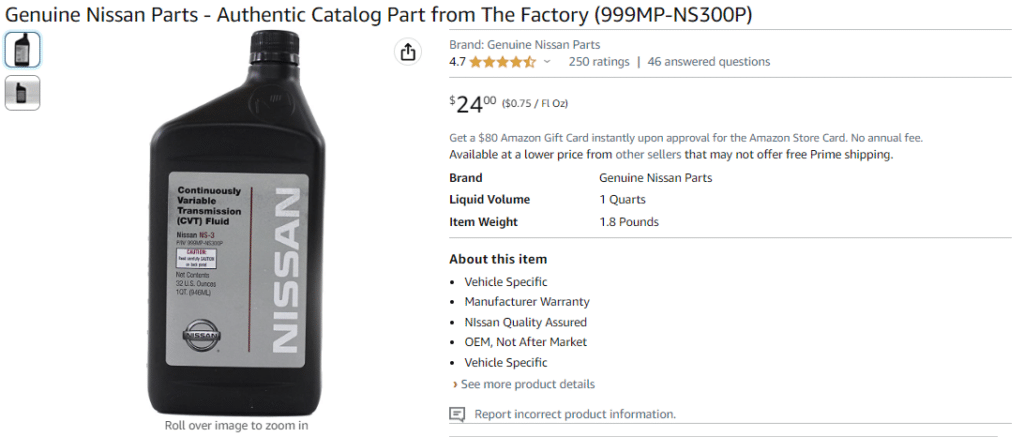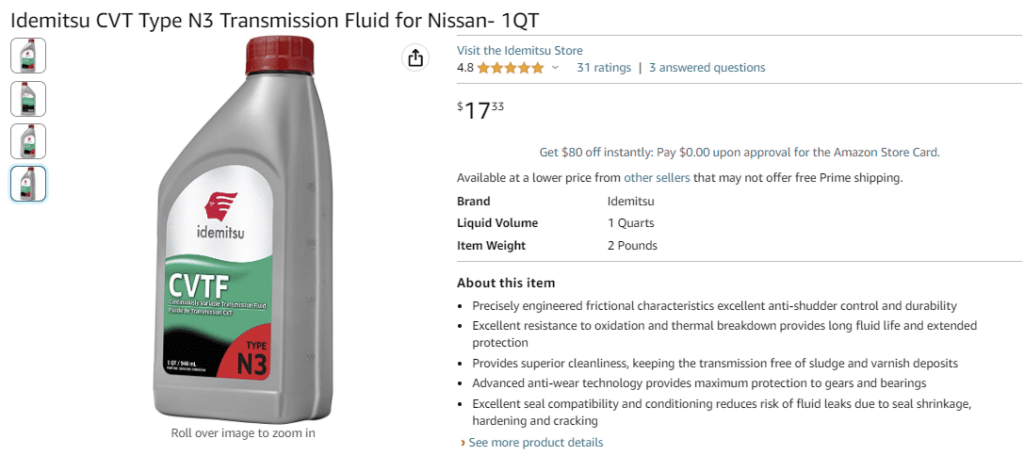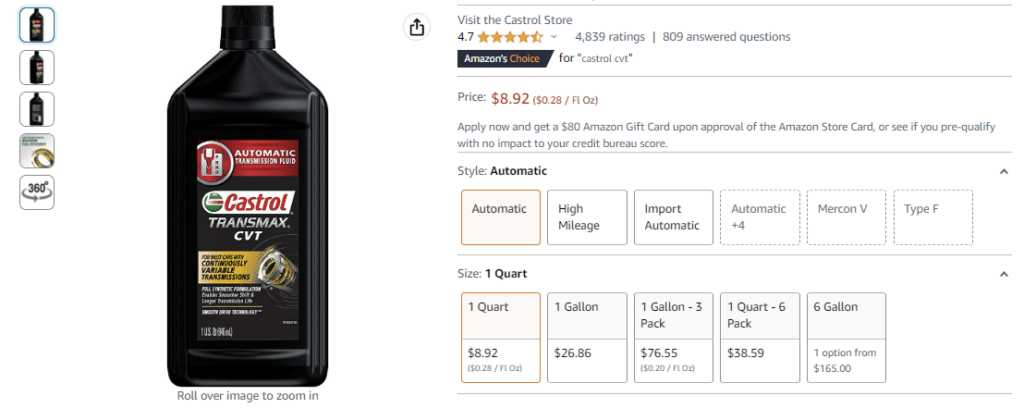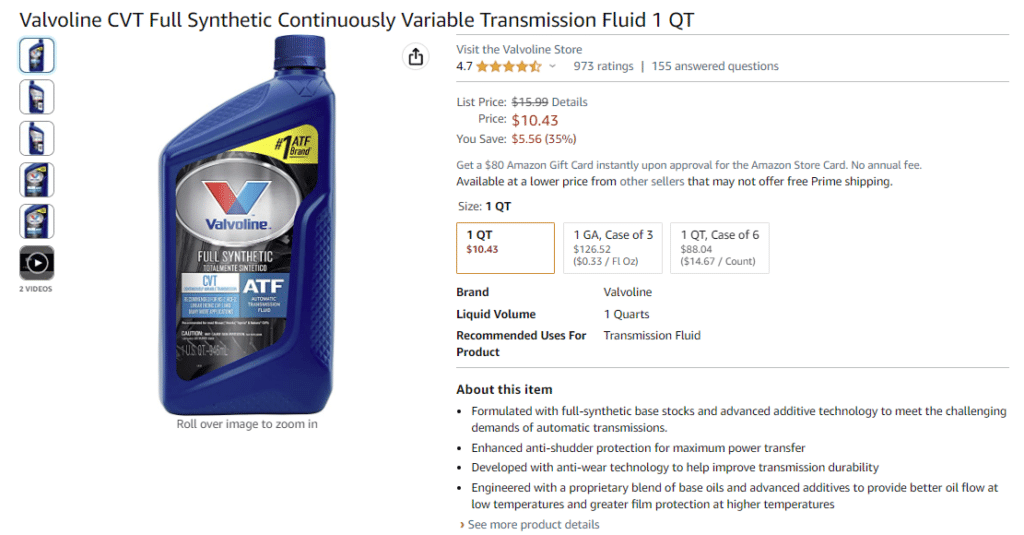Continuously Variable Transmissions (CVT) have become increasingly popular in recent years, prized for their efficient power delivery and fuel economy. Unlike traditional automatic transmissions, CVTs provide seamless, step-less shifting by utilizing a pair of pulleys and a belt rather than gears. This innovative design ensures the engine operates at its most efficient RPM, regardless of the vehicle’s speed.
The magic behind CVTs’ smooth operation and efficiency lies in their unique transmission fluid, playing an equally crucial role as the CVT itself. CVT fluid is specially formulated to lubricate the moving parts within the transmission, transfer heat, and transmit power from the engine to the wheels.
Among the various CVT fluids available on the market, Nissan’s CVT fluid NS-3 has gained a reputation for its outstanding performance. However, with its specific design for Nissan’s CVT engines, it comes with a premium price tag. This has led many to seek effective and cost-efficient alternatives. This article explores these options and offers guidance on selecting the right one for your needs.
What Is Nissan CVT Fluid NS-3?
Nissan CVT Fluid NS-3 is a uniquely developed transmission fluid designed specifically for Nissan’s line of CVT engines. It is used predominantly in newer Nissan vehicles from the 2013 model year onward.
The formulation of NS-3 is proprietary and features specific frictional properties that optimize the performance of Nissan CVTs. It’s a high-quality, full synthetic transmission fluid characterized by its light green color and is not to be mixed with other transmission fluids.

The primary function of Nissan CVT Fluid NS-3, like all transmission fluids, is to lubricate the transmission’s internal components, preventing premature wear and tear. However, NS-3 goes beyond basic lubrication:
- Heat Transfer: The fluid serves as a coolant, helping to maintain the CVT’s optimal operating temperature by transferring heat away from the components.
- Power Transmission: It allows power transfer from the engine to the car’s wheels. Its specific friction properties aid in providing seamless and efficient power delivery.
- Cleanliness and Protection: The fluid helps to keep the transmission clean, preventing sludge and varnish deposits. Moreover, it offers corrosion protection for the metal components inside the transmission system.
- Anti-Shudder Performance: NS-3 has excellent anti-shudder characteristics, enabling smooth operation and transitions in the CVT system.
In essence, the NS-3 fluid is not just a lubricant but a critical component designed to maintain the performance, efficiency, and longevity of Nissan’s CVT transmissions. However, its specific design and premium pricing have led many to seek out high-quality and cost-effective alternatives.
What Are The Equivalents To Nissan CVT Fluid NS-3?
While there are many types of transmission fluids available on the market, not all of them are suitable for use in a Nissan CVT. The equivalents to Nissan CVT Fluid NS-3 are those that meet or exceed the performance and specification standards of NS-3 and are compatible with Nissan’s CVT engines.
Remember that using the wrong transmission fluid can damage your transmission, so it’s always advisable to check your vehicle’s manual or consult with a trusted mechanic before making a switch.
Here are three examples of compatible alternatives to Nissan CVT Fluid NS-3:

This fluid has been precisely engineered to mimic the frictional characteristics of Nissan CVT Fluid NS-3, offering excellent anti-shudder control and durability. It provides exceptional resistance to oxidation and thermal breakdown, extending the fluid’s life and offering prolonged protection. In addition, Idemitsu CVT Type N3 keeps the transmission free from sludge and varnish deposits, reducing the risk of fluid leaks due to seal shrinkage, hardening, and cracking.

This fluid boasts enhanced friction durability for smoother and longer transmission life. It provides superior high-temperature protection to resist oxidation effectively. Moreover, Castrol Transmax ATF CVT is suitable for use in various CVT applications, making it an excellent alternative for Nissan CVT Fluid NS-3.

Valvoline’s full synthetic CVT fluid is designed to meet the challenging demands of automatic transmissions. It offers enhanced anti-shudder protection for maximum power transfer and is developed with anti-wear technology to improve transmission durability. It performs well under various temperature conditions, offering optimal oil flow at low temperatures and improved film protection at higher ones.
While these alternatives offer similar performance characteristics to NS-3, each comes with its unique benefits and trade-offs. Therefore, when choosing an equivalent, it is critical to consider your vehicle’s specific needs and operating conditions.
Comparing Nissan CVT Fluid NS-3 With Alternatives
When it comes to comparing Nissan’s CVT Fluid NS-3 with its alternatives, there are a few key factors I like to consider. These include performance, price, and availability.
Performance
I can vouch for the superior performance of Nissan’s NS-3 fluid. It’s specifically designed for Nissan CVTs, providing seamless operation and a longer transmission life. However, the alternatives listed above also offer commendable performance.
The Idemitsu CVT Type N3, for example, provides excellent resistance to oxidation and thermal breakdown, making it an ideal choice for high-mileage vehicles or those operating in harsh conditions. On the other hand, Castrol Transmax ATF and Valvoline’s full synthetic CVT fluid boast enhanced friction durability and anti-shudder protection, ensuring smooth transmission performance over extended periods.
Price
When it comes to cost, Nissan’s NS-3 fluid is on the higher side, with a price tag of $24 per quart. If budget is a primary consideration, then the Castrol Transmax ATF, priced at just $8.92 per quart, could be a more attractive option. Idemitsu CVT Type N3 and Valvoline’s full synthetic CVT fluid fall in the middle, priced at $17 and $15 per quart, respectively.
While the lower-priced alternatives may seem attractive, it’s crucial to remember that cheaper isn’t always better when it comes to transmission fluid. It’s essential to balance cost considerations with your vehicle’s specific needs and the fluid’s performance characteristics.
Availability
In terms of availability, all of these fluids are readily accessible online and in most auto parts stores. However, availability may vary depending on your location. It’s always advisable to check with your local suppliers or preferred online retailer for current stock levels.
In summary, while Nissan’s CVT Fluid NS-3 is a top performer, there are several viable alternatives available that offer similar performance at a more budget-friendly price point. Always remember to consult your vehicle’s manual and consider your vehicle’s specific needs when choosing a CVT fluid.
Key Considerations When Choosing An Equivalent
As a mechanic, I am frequently asked for advice on choosing an equivalent CVT fluid. Here are the key considerations I always highlight:
Compatibility with the Specific Car Model
The foremost factor to consider is whether the alternative fluid is compatible with your specific car model. Not all CVT fluids are created equal, and what works for one model might not work for another. Check your vehicle’s manual for the manufacturer’s recommended specifications or consult with a trusted mechanic. You want to ensure that the chosen fluid will not adversely affect your transmission’s performance.
Adherence to Manufacturer’s Guidelines
Adhering to your car manufacturer’s guidelines is crucial when choosing a transmission fluid. These guidelines are based on extensive testing and are designed to ensure optimal performance and longevity of your vehicle’s transmission. Ignoring these guidelines could lead to poor performance or, in the worst case, serious damage to your transmission.
Potential Impacts on Warranty
Another important factor is the potential impact on your vehicle’s warranty. Some car manufacturers may void the warranty if non-approved fluids are used. Before choosing an alternative CVT fluid, check your vehicle’s warranty details. Sticking with the manufacturer-recommended fluid might be more beneficial if it means keeping your warranty intact.
While alternatives to Nissan’s CVT Fluid NS-3 can offer similar performance at a lower price, it’s crucial to consider these factors before making a decision. The goal is to balance cost savings with maintaining the optimal performance and longevity of your transmission.
Nissan NS-2 Vs Nissan NS-3 CVT Fluid
Nissan NS-2 and NS-3 are both CVT fluids designed specifically for Nissan vehicles equipped with Continuously Variable Transmissions. While they serve similar functions, they differ crucially based on the specific requirements of different Nissan models and their respective transmission technologies.
The NS-2 CVT fluid was used in Nissan vehicles prior to 2013. It was designed with the technology and requirements of Nissan’s CVT engines at that time. The NS-2 fluid is generally a high-quality lubricant that promotes the efficient operation and longevity of Nissan’s earlier CVT systems.
Nissan introduced the NS-3 CVT fluid for its vehicles in 2013 and beyond, aligning with their CVT engine technology advancement. The NS-3 fluid has improved properties that help support the function of newer CVT systems. It offers better protection, performance, and efficiency than the latest CVT transmissions in Nissan’s lineup.
While both fluids are designed to cater to Nissan’s CVT engines’ needs, they are not interchangeable due to the progression in technology and the different requirements of the CVT systems they are designed for. NS-3 offers better anti-shudder protection, superior temperature stability, and higher anti-wear characteristics compared to NS-2, addressing the demands of the newer, more advanced CVT systems.
It’s essential to use the correct CVT fluid as specified by Nissan for each model and year. Using NS-3 in a vehicle designed for NS-2, or vice versa, could lead to performance issues or even damage the transmission. Always consult your vehicle’s manual or a trusted mechanic when unsure about the right type of CVT fluid for your Nissan vehicle.
References
- Nissan’s official website: www.nissanusa.com
- AutoZone: www.autozone.com
- NAPA Auto Parts: www.napaonline.com
- BobistheOilGuy: bobistheoilguy.com
